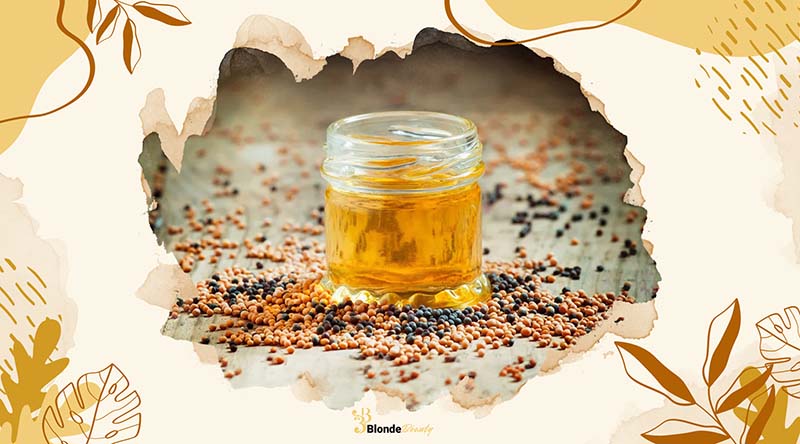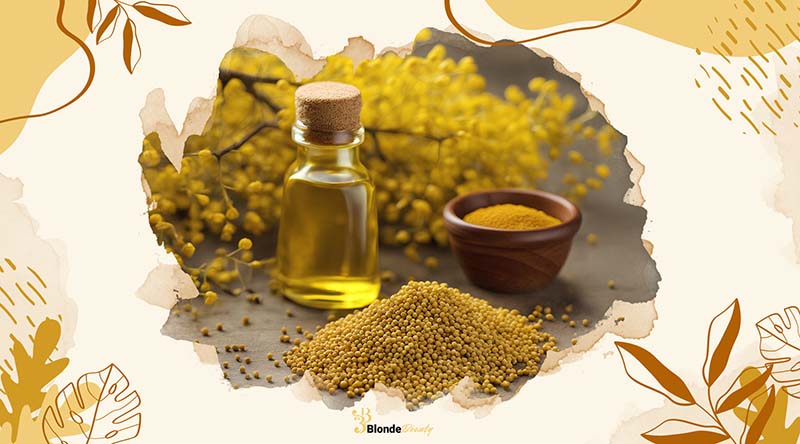Experience the traditional power of mustard oil in hair care. With a rich history in natural remedies, mustard oil is gaining recognition for its potential to enhance hair health.
This blog explores the key question, “Is mustard oil good for hair?” by examining its properties, reported benefits, and scientific insights.
Find out if mustard oil could be the natural remedy your hair care routine has been lacking.
Is Mustard Oil Good for Hair?
Mustard oil is often praised for its health benefits, especially for the heart and reducing inflammation. However, there are not many studies on its effects on hair loss and scalp health. Most research is done in labs, not on real people, and the amounts used in labs are much higher than what is safe for the scalp.
Even though there isn’t much scientific proof, the ingredients in mustard oil hint at several hair benefits:
- Antioxidant Properties: Mustard oil has Vitamins A and E, and amino acids like cysteine. These help fight damage from free radicals, which can be good for hair health.
- Hair Conditioning and Hydration: It contains alpha-linoleic acid, a fatty acid that can make hair smoother and shinier.
- UV Protection and Anti-Aging: The Vitamin E in mustard oil helps protect hair from sun damage and may slow down aging effects on hair.
While these benefits sound promising, there’s not enough proof to say for sure how well mustard oil works for hair. The effects can differ from person to person.

Notes:
- Patch Test: Always do a small test on your skin before using mustard oil on your scalp to avoid allergic reactions.
- Moderation: Use mustard oil in small amounts to prevent scalp irritation.
Benefits of Mustard Oil for Hair
Reduces Scalp Inflammation
“Mustard oil is rich in fatty acids, such as omega 3s and 6s, and minerals including calcium, iron, and zinc, which provide essential nutrients and act as anti-inflammatories,” says Jennifer Chwalek, MD, a board-certified dermatologist at Union Square Laser Dermatology in New York City.
Possesses High Antioxidant Properties
The presence of antioxidants in mustard oil, such as vitamin E, helps to prevent oxidative stress and damage to the scalp and hair follicles.
These antioxidants protect hair from environmental damage and free radicals, promoting healthier hair growth.
Prevents Dry Hair
Fatty acids found in mustard oil aid in decreasing dryness. They help replace lipids that have been lost due to pollution, styling, and other chemical processes. This rejuvenates hair strands, leaving them lustrous and healthy.
Mustard oil is particularly beneficial for dry hair, making it look shiny and feel softer.

Has Antibacterial and Antifungal Properties
Mustard oil contains ALA and has a high uric acid content, which helps cleanse the scalp and eliminate fungi and bacteria that accumulate on the scalp and block hair follicles.
This keeps the scalp clean and reduces the risk of infections that can lead to hair loss.
May Aid in Promoting Hair Growth
Enriched with a multitude of vitamins such as vitamins E, K, and A, mustard oil promotes hair growth. It is a good source of iron, magnesium, antioxidants, calcium, and zinc, which are essential for healthy hair.
Mustard oil also contains beta-carotene, which helps address the concern of untimely grey hair, promoting overall hair health.

Can Eliminate Mites
According to William Gaunitz, a certified trichologist and founder of the Gaunitz Trichology Method, hair loss can sometimes be caused by a parasite known as demodex folliculorum, one of two types of demodex mites that live on human skin.
Mustard seed can kill these mites. However, since Demodex folliculorum feed on oil, Gaunitz advises against using mustard oil on the scalp and recommends tinctures made with ground mustard powder as a better option.
Enhances the Overall Appearance of Hair
Mustard oil protects hair from day-to-day damage due to its fatty acid content. It fills the gaps between cuticle cells, protecting hair follicles from different kinds of surfactants.
This makes hair shinier and helps smooth split ends, enhancing the overall appearance of the hair.

Notes:
- Mixing Oils: You can mix mustard oil with other oils like coconut or almond oil to boost its benefits.
- Routine Use: Regular use of mustard oil, along with a healthy diet and good hair care habits, might improve your hair health over time.
Instructions for Using Mustard oil Effectively For Hair
Mustard Oil and Yogurt Pack
- Ingredients: Mustard oil, yogurt
- Instructions: Mix yogurt and mustard oil in a bowl. Apply this mixture to your scalp. Wrap your hair in a hot towel and leave it on for about 30-40 minutes. Wash with a mild shampoo. This pack will moisturize the scalp and make the hair shiny and soft.
Mustard Oil and Aloe Vera Pack
- Ingredients: Mustard oil, aloe vera
- Instructions: In a bowl, mix a little mustard oil with aloe vera gel. Apply this mixture to your hair and scalp. Leave it on for an hour, then wash with a regular shampoo and conditioner. This pack helps prevent hair loss and promotes healthy hair growth.
Mustard Oil and Lemon Juice Pack
- Ingredients: Mustard oil, lemon juice, fenugreek powder
- Instructions: Take equal amounts of mustard oil, lemon juice, and fenugreek powder in a bowl and mix them well. Apply this mixture to your hair. Leave it on for an hour, then wash with a mild shampoo. This pack results in soft, bouncy, and healthy hair.
Mustard Oil and Banana Pack
- Ingredients: Ripe bananas, mustard oil, (optional) yogurt
- Instructions: Mash ripe bananas and mix them with mustard oil. You can add some yogurt to the mixture to adjust the consistency. Apply this pack to your scalp to prevent dry hair. Leave it on for about 30-40 minutes, then wash with a mild shampoo.
Notes:
- Regular Use: Use these packs regularly for the best results, but not more than once a week to avoid any potential scalp irritation.
- Mild Shampoo: Always use a mild shampoo to wash your hair after using these packs to avoid stripping your hair of natural oils.
Hair Types Consideration
Mustard oil is generally excellent for hair and scalp health, but its properties can irritate certain skin, scalp, and hair types.
Sensitive and Oily Scalp:
- People with very sensitive and oily scalps should use mustard oil sparingly, limiting its use to once or twice a month.
- Another option is to dilute mustard oil with a milder oil base, such as coconut oil, to reduce its potency.
Thick Consistency:
- Mustard oil is thick and may require multiple washes to rinse off completely.
- Those with damaged, brittle, or chemically treated hair should avoid using mustard oil, as it can be difficult to remove and may cause further damage.
General Advice:
- For most hair types, mustard oil is safe and beneficial.
- To avoid irritation, always do a patch test before full application.
- Dilute mustard oil if necessary to suit your hair type and reduce potential irritation.
With these considerations, mustard oil can be a valuable addition to your hair care routine.

Side Effects of Mustard Oil on Hair
External application of mustard oil for hair generally has minimal side effects. However, it contains naturally occurring compounds like allyl thiocyanate, erucic acid, and capsaicin, which may cause mild irritation for some people.
Potential Side Effects:
- Scalp Irritation: Compounds like allyl thiocyanate, erucic acid, and capsaicin can cause mild irritation, especially in sensitive individuals. This may result in redness, itching, or a burning sensation on the scalp.
- Clogged Hair Follicles: In rare cases, mustard oil might clog hair follicles, potentially leading to issues such as folliculitis or other scalp conditions.
- Eye Irritation: Mustard oil can cause significant eye irritation if it accidentally comes into contact with your eyes. This can result in redness, watering, and discomfort.
To avoid these side effects, always perform a patch test before using mustard oil on your scalp and hair and be cautious to prevent contact with your eyes.
Conclusion
When applied topically, mustard oil is a fantastic oil that prevents premature greying, stops hair loss, and promotes hair growth. So, is mustard oil good for hair? Definitely. While it generally doesn’t have any side effects, it can occasionally irritate the skin.
Therefore, it’s important to do a patch test before using it to ensure you don’t have an allergic reaction. By taking this simple precaution, you can safely enjoy the numerous benefits of mustard oil for your hair.
Don’t forget to check out more blogs from Blonde Beauty for additional tips and insights on achieving your best hair ever.

Laureate Professor Clare Collins
Professor Clare Collins is a leading expert in nutrition and dietetics at the School of Health Sciences, part of the College of Health, Medicine and Wellbeing. Her work is changing the way we think about food and health. She grew up as one of nine children and was the first in her family to finish high school and go to college. This background gave her a strong work ethic and a deep appreciation for seizing opportunities.
As the Director of the Hunter Medical Research Institute’s Food and Nutrition Program and a recipient of three NHMRC Research Fellowships, Professor Collins is making a big difference in public health. She focuses on helping people who are often overlooked, using new technologies like apps and online programs to improve their nutrition and reduce the risk of chronic diseases.
Professor Collins is well-respected and has been recognized as a Fellow in four major health and science organizations. She leads a diverse team of experts, including dietitians, computer scientists, and engineers, working together on global health projects.
Her achievements are impressive. She has received over $29 million in research funding, published more than 450 papers, and helped 35 PhD and Master’s students complete their degrees. She’s also active in sharing her knowledge with the public. She has developed tools like the Australian Eating Survey and the Healthy Eating Quiz, and she often appears in the media to talk about nutrition.
PUBLISHED ARTICLES
- Collins, C. (2019). “The Effect of a Pilot Dietary Intervention on Pain Outcomes in Patients Attending a Tertiary Pain Service.”
- Collins, C. (2022). “Variation in cardiovascular disease risk factors among older adults.”
- Collins, C. (2022). “Evaluation of an online intervention for improving stroke survivors’ health-related quality of life: A randomised controlled trial.”
These articles show Professor Collins’s commitment to understanding how better nutrition can improve health. Her work is important for researchers, doctors, and anyone interested in healthy living.
